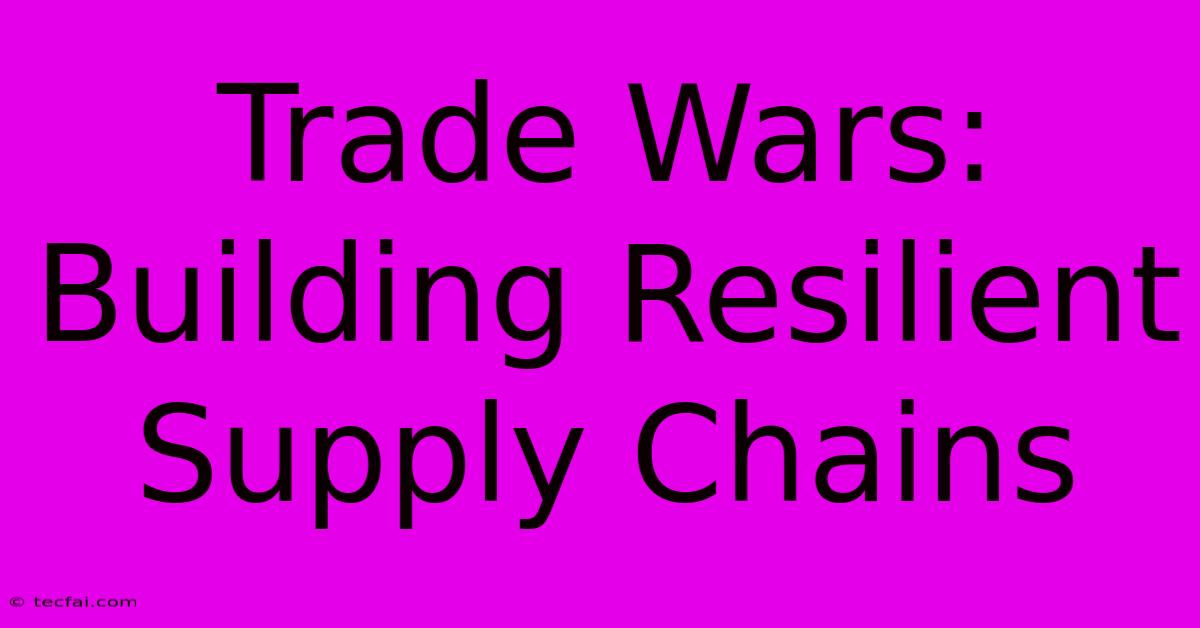Trade Wars: Building Resilient Supply Chains

Discover more detailed and exciting information on our website. Click the link below to start your adventure: Visit Best Website tecfai.com. Don't miss out!
Table of Contents
Trade Wars: Building Resilient Supply Chains
The landscape of global trade has become increasingly volatile in recent years. Trade wars, protectionist policies, and geopolitical instability have exposed the vulnerabilities of many companies reliant on complex, globally dispersed supply chains. Building resilient supply chains is no longer a competitive advantage; it's a necessity for survival. This article explores the challenges posed by trade wars and offers practical strategies for building more robust and adaptable supply chain networks.
Understanding the Impact of Trade Wars on Supply Chains
Trade wars, characterized by tariffs, quotas, and other trade barriers, directly impact supply chains by increasing costs and creating uncertainty. Here's how:
- Increased Costs: Tariffs significantly raise the price of imported goods, impacting both raw materials and finished products. This leads to higher production costs and potentially reduced profit margins.
- Supply Disruptions: Trade restrictions can lead to delays or even complete disruptions in the flow of goods. Geopolitical tensions can further exacerbate these disruptions.
- Increased Complexity: Navigating a complex web of tariffs and regulations requires significant administrative effort and expertise, adding another layer of complexity to supply chain management.
- Shifting Geopolitical Landscape: Trade wars often lead to unpredictable changes in international relations, further destabilizing supply chains and requiring companies to constantly adapt.
Strategies for Building Resilient Supply Chains
Companies need to adopt a proactive approach to mitigate the risks associated with trade wars and build more resilient supply chains. Key strategies include:
-
Diversification of Sourcing: Reducing reliance on single suppliers or regions is crucial. Diversifying sourcing geographically can help mitigate risks associated with trade restrictions or political instability in a particular region. Consider exploring alternative suppliers in different countries with favorable trade relationships.
-
Nearshoring and Reshoring: Bringing manufacturing closer to home, through nearshoring (moving production to nearby countries) or reshoring (returning production to the domestic market), can reduce transportation costs, lead times, and the risk of disruptions caused by trade wars. However, companies need to carefully weigh the costs and benefits associated with these strategies.
-
Inventory Management: Optimizing inventory levels is essential to balance the need for sufficient stock to meet demand with the costs of holding excessive inventory. Advanced inventory management techniques, such as just-in-time inventory, can help mitigate the impact of supply chain disruptions.
-
Technology Adoption: Leveraging technology, such as blockchain, AI, and advanced analytics, can improve supply chain visibility, track goods in real-time, and predict potential disruptions. This allows for proactive intervention and mitigation of risks.
-
Stronger Supplier Relationships: Building strong, collaborative relationships with suppliers is critical. Open communication, shared risk assessments, and joint planning can help address potential challenges and ensure a more stable supply chain.
-
Risk Management and Contingency Planning: Developing robust risk management processes and contingency plans is crucial. Companies should identify potential risks, assess their impact, and develop plans to mitigate them. This involves scenario planning and developing alternative sourcing options.
The Future of Supply Chains in an Uncertain World
Trade wars are likely to remain a feature of the global economic landscape for the foreseeable future. Companies must adapt and build more resilient supply chains that can withstand shocks and disruptions. This requires a strategic approach that encompasses diversification, technology adoption, strong supplier relationships, and robust risk management. By embracing these strategies, businesses can not only survive but thrive in an increasingly uncertain world. The focus must shift from solely optimizing for cost to optimizing for resilience and adaptability. The future of successful businesses hinges on their ability to navigate this new reality effectively.

Thank you for visiting our website wich cover about Trade Wars: Building Resilient Supply Chains. We hope the information provided has been useful to you. Feel free to contact us if you have any questions or need further assistance. See you next time and dont miss to bookmark.
Featured Posts
-
Best Black Friday Deals 2024
Nov 30, 2024
-
Georgia Vs Georgia Tech Game Time Channel Odds
Nov 30, 2024
-
Sick New World 2025 Cancellation Confirmed
Nov 30, 2024
-
Assisted Dying Bill Clears Parliament
Nov 30, 2024
-
Brighton Vs Premier League On Var
Nov 30, 2024
